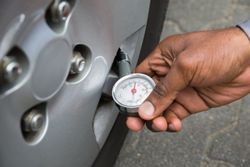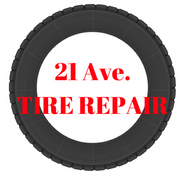
While you may be working on ways to keep your car from overheating this summer, you may not realize that the heat can equally affect and damage your tires. Read below to learn how you can protect them from overheating or breaking down this summer.
How Summer Weather Affects Your Tires
The Temperature Creates Pressure Changes
When the outside temperature increases, the pressure inside your tires will also increase. The heat can come from the pavement or the surrounding air and lead to overinflation, which can affect the quality and safe handling of your drive.
Heat Degrades Rubber
High heat can also break down the compounds of the rubber that keep them flexible. If you have ever changed out old wheels for new, you may have noticed how brittle the old tires have become.
Direct sunlight and friction with hot surfaces can break down these compounds much faster than expected, causing the hardened rubber to crack or leak. Neglecting to care for or change out brittle tires can potentially lead to blowouts.
Signs to Watch Out For
Hot Tires
Feel how hot the rubber is before getting in the car. While the tires may have overinflated due to the excess heat, do not let out any air in order to get on the road faster. Doing so will lead to you driving on underinflated wheels, which is equally as dangerous.
Wait for them to cool down before getting in the car. You can also park in shady spaces or garages in order to prevent them from getting too hot.
High Air Pressure

Many cars have different baseline pressures. You can find yours on the inside panel of your driver’s door. On the hotter days, check your car’s pressure before leaving the house and make sure to keep it within the recommended range.
If your car has a tire pressure monitoring system (TPMS), it will alert you when your pressure has dropped. TPMS systems will not, however, tell you if they have overinflated. Manual pressure gauges will provide you with an accurate reading.
If you do not have a pressure gauge at home, you can also check your pressure at gas stations. Most offer pressure-checking and fill-up stations. However, you should purchase a manual pressure gauge and keep it in your glove compartment during the summer months.
For first-rate tire repair, goods, and related services, contact 21 Ave Tire Repair in Paterson, NJ. For seven years, these licensed professionals have provided the best quality inventory to choose from as well as efficient and effective services to get you on your way again quickly. Call (973) 225-0923 to schedule your next appointment or visit their website for a comprehensive list of their inventory brands and unrivaled services.
About the Business
Have a question? Ask the experts!
Send your question

